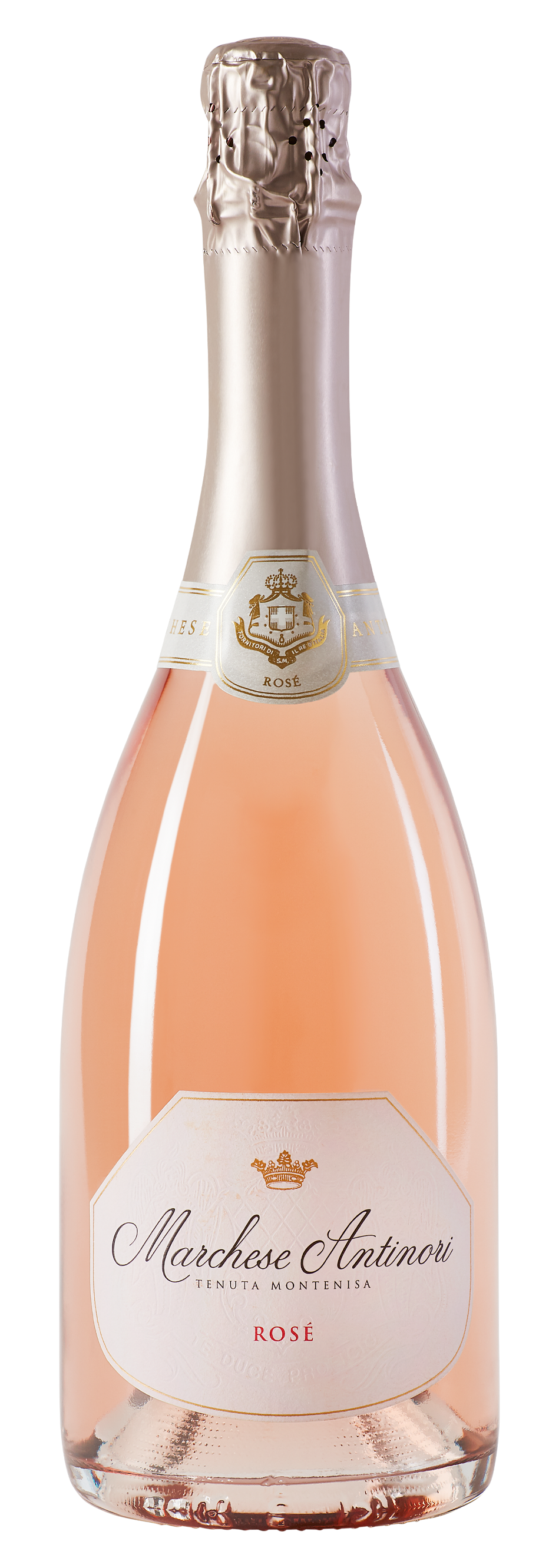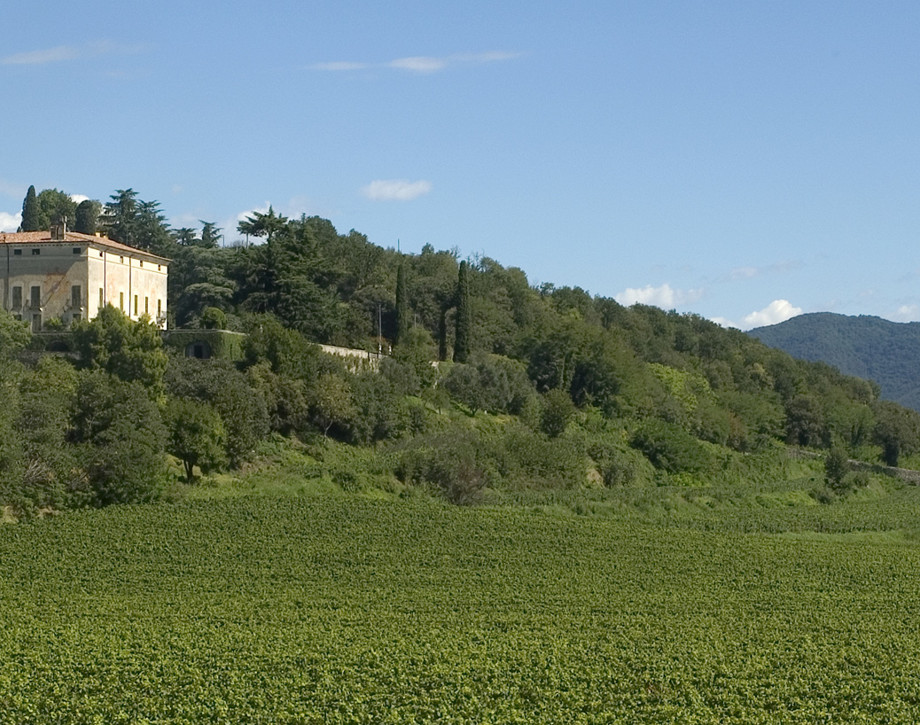Rosé

Historical Data
The Montenisa estate is located around the hamlet of Calino, near Lake Iseo in the heart of the Franciacorta appellation. The vineyards surrounding the proprietary villa of the Maggi family have been the heart of the production of Marchese Antinori Franciacorta since 1999.
The Wine
Created by the interaction between the experience of the Antinori family and the demonstrated high viticultural quality of a territory, Franciacorta, the “Classics”- Marchese Antinori Cuvée Royale, Rosé, and Blanc de blancs - are produced from a selection of Chardonnay, Pinot Nero, and Pinot Bianco grapes.
Vinification
The must was fermented in stainless steel tanks. The second fermentation took place in bottle and the wine remained on its lees for 24 months before dégorgement.
Tasting Notes
A light onion skin in color with a creamy bubbling and a light and delicate sparkling. The nose is fragrant and decisive in personality, and is characterized by the unmistakable aromas of Pinot Noir’s dried wild flowers. The palate shows a savory crispness in perfect balance with the structure in a wine of notable harmony and elegance. The ideal serving temperature for the wine is between 45° and 48° Fahrenheit (7°-9° centigrade) Matches with food and occasions for drinking: The balance and harmony of this rosé make it a perfect accompaniment to a dinner of seafood and shellfish, pigeon, or white meat in general. Its versatility make it an interesting match for berry fruit desserts or lightly bitter chocolate.

Historical Data
The Montenisa estate is located around the hamlet of Calino, near Lake Iseo in the heart of the Franciacorta appellation. The vineyards surrounding the proprietary villa of the Maggi family have been the heart of the production of Marchese Antinori Franciacorta since 1999.

The History
Back in 1928, Niccolò Antinori decided to christen this wine Villa Antinori, in honor of the family’s eponymous villa; it was a reflection of his own personal interpretation of Chianti Classico’s and Tuscany’s unique identity.
The Style
Villa Antinori was first crafted in 1928 by Marchese Niccolò Antinori, Piero Antinori’s father, as the Antinori family’s signature wine; an exceptional wine that can represent the family’s history, identity and continuity like no other. “Villa Antinori is a full-blooded Tuscan red […] which grapes are grown, mature and are harvested from our Tuscan estates and then fermented and aged in the Antinori family estates.” Piero Antinori.
The design
The label’s design represents our concept of home, our territory and Tuscany. “The French have châteaux, but we have Villas!” Niccolò Antinori cheerfully explained his choice for the illustration on the front label, an innovative design that broke with more traditional packaging conventions of that time.
In Honor of the Monaldeschi della Cervara Family
The wine’s name honors the Monaldeschi della Cervara family who was the historic owner of Castello della Sala in the XVI century.
An old railway station
The Vignaferrovia vineyard takes its name from a characteristic old nineteenth century railway station still located a short distance from the vines.
Grown in an area with Great Potential
Poggio alle Nane comes from a winegrowing area well known for its production of high quality wines, an area in which both Cabernet and Carménère best express their characteristics.
A red amidst whites
At Castello della Sala, an area historically important for white wines, Pinot Nero offers an authentic and typical expression of its variety with a strong territorial character.
An ancient grape variety
Aleatico, an old and traditional Tuscan grape variety grown since Etruscan times, is able to give a modern expression of itself in this unique territory.
Villa del Cigliano
Villa del Cigliano, located in the gently rolling hillsides of San Casciano Val di Pesa, in the province of Florence, has always been a symbol of strong family relationships; the villa has watched over the lives of generations of Antinori family members since 1546, the year Alessandro di Niccolò Antinori became the owner of the property.
The Design
The label was designed by Silvio Coppola in 1974 for the release of Tignanello 1971. The idea to commission this artist was discussed at an event at Castello della Sala in 1973. Silvio Coppola was an important Italian graphic and interior designer who was famous for his minimalist lighting fixtures and austere furniture but also for book cover designs for Italian publishing company Feltrinelli. Silvio Coppola was the perfect match for the job.
The Bolgheri Amphitheater
The Guado al Tasso estate’s most characteristic geographic feature is the Bolgheri Amphitheater, a beautiful plain encircled by rolling hillsides that faces the Tyrrhenian Sea. The shape of the territory creates a unique microclimate with beneficial temperature fluctuations. The estate’s vineyards are located at the foot of the amphitheater, an optimal position as cold nocturnal breezes cool down the vines. These particular climatic conditions give the grapes pronounced aromas and guarantee a perfect ripening of the berries.
The Barrique
Cervaro della Sala was one of the first Italian white wines to have malolactic fermentation and aging take place in barriques.
The Name
Poggio alle Nane’s name comes from the area where its vines grow. Duck breeding farms once existed and the name “Nane” is local dialect for duck. The vineyards extend from the hillside to the lake that are still part of the property.
Rocky soils
The Vignaferrovia vineyard grows on rocky, gravelly soils, a condition that naturally limits the grapevine’s growth rate and enhances the quality of the berries.
Winding vineyards
The 4 hectares (10 acres) of Pinot Nero grow along the hillsides shaping the landscape into a series of sinuous terraced vineyards.
A single letter symbol
“A” represents in one single letter the combination of the estate’s initials, Fattoria Aldobrandesca, and the grape’s variety, Aleatico.
The Signature
Marchese Piero Antinori, the current Honorary President, decided to have his father, Niccolò Antinori, sign the label as a sign of recognition for his father’s confidence in him.
Te Duce Proficio
Guado al Tasso added the Antinori family’s historic family crest on the capsules.
The Concept
The idea behind Cervaro della Sala was to craft a white wine able to age over time.
Sea breezes
Southwestern vineyard exposure allows sea breezes to mitigate hot summer temperatures and limit heat spikes.
Understanding nature
The particularly hot climate of Castello della Sala has forced agronomists to invent new ways to protect the grapes from the hot summer sun. The vines’ shoots are allowed to grow in length and are then folded over the plant so its leaves can shade the Pinot Nero grape clusters.
A Pursuit for Balance
“A” was crafted following the family’s pursuit for exceptional balance between Aleatico’s pronounced character and the unique qualities of the estate’s volcanic soils.
Te Duce Proficio
The historic family crest of the Antinori family
A Tribute to the Della Gherardesca Family
Guado al Tasso designed a label with the Della Gherardesca family crest and the initials DG as a tribute to the former estate owners.
The Enologist
In 1985, Renzo Cotarella, who was chief enologist at Castello della Sala at that time, made the first vintage of Cervaro della Sala.
A personal interpretation
The Antinori family wanted to give their own deeply personal interpretation of the historic wine, Brunello di Montalcino.
The Sun
Tignanello’s stylized “Sun” by Silvio Coppola

Tenuta Montenisa
The estate is located in the heart of the Franciacorta production zone around the centuries-old hamlet of Calino. The vine has always been cultivated in this area of important wines. Some in fact maintain that “Franciacorta” has its origin in the phrase “Petite France”, an affectionate name given to it by Charlemagne.


















